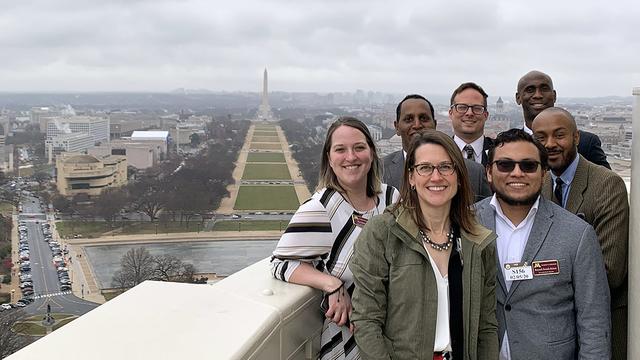Public policy aficionados in Minnesota look forward to this time of year, when they find out which of their friends and colleagues are chosen to the Humphrey School’s Policy Fellows program. Social media sites like Twitter, Facebook, and LinkedIn are abuzz with excited announcements and congratulatory notes to the three dozen or so who are accepted into the program.
It’s a big deal. The Policy Fellows program, now in its 30th year, attracts some of the best and brightest emerging leaders from throughout Minnesota - individuals who are seeking a better understanding of how they can have an impact in their communities and in the world.
During the nine-month program, the fellows meet monthly for full-day sessions on policy, politics, leadership, and other topics. Together, they also take a four-day study trip to Washington, DC.
This year’s cohort, announced today, includes participants from the Twin Cities area and from around Greater Minnesota, including Grand Marais, Mankato, St. Joseph, Aitkin, Hill City, and Albany. They represent the state’s business, government, and nonprofit sectors, and come from a variety of racial and cultural backgrounds.
Kate Cimino, (former) executive director of the program, describes the applicant pool as “robust and impressive,” even in a difficult year. She says the high level of interest in the program speaks to the desire among community leaders to build bridges and improve relationships.
That Policy Fellows have an opportunity to get to know people from different political affiliations, cultural backgrounds, and geographic regions is a vital aspect of the program, says Cimino.
“Minnesota is oriented toward thoughtful political engagement and good governance,” she says. “Our program is one of those places where Minnesotans can come together across sectors and political differences. It’s part of sustaining and building the reputation we have in our state.”
Another goal of the Policy Fellows program is to diversify the voices and perspectives of those engaged in public policy and prepare the next generation of policy leaders. The new cohort “reflects the ever-changing nature of Minnesota,” Cimino says.
Fellows faced the unexpected
The 2019-2020 fellows, who just concluded the program in June, had to adapt to a series of unexpected challenges. For example, their trip to Washington, DC, in early February coincided with the US Senate’s vote on President Trump’s impeachment, and their tour of the US Capitol building was cut short due to protests.
Shortly afterward, the coronavirus pandemic required them to move their remaining sessions online. Then in May and June, cohort members who were nonprofit leaders, business leaders, National Guard members, and community liaisons, became immersed in responding to George Floyd’s death and its aftermath.
Even with all the upheaval, the fellows completed small-group research projects on a variety of public policy issues, such as improving the foster care system, attracting more teachers of color to Minnesota schools, exploring new affordable housing options, and increasing protections for essential workers.
“We had to adapt quickly to the pandemic and finish the program online, and that was a challenge,” Cimino says. “But this cohort of fellows leaned on each other and stayed together for a really meaningful learning experience."
One of the participants, Victoria Adofoli, agrees with that assessment.
"I believe the entire cohort was challenged, and experienced personal and intellectual growth,” Adofoli says. “I certainly developed more empathy and understanding for people on both sides of the political aisle."
Alumni network
After they complete the Policy Fellows program, participants join a network of more than 800 alumni, who go on to lead in many sectors and regions in Minnesota. Many show their thanks by becoming donors, contributing to scholarships for new Fellows; or serve on the program’s alumni board.
“Policy Fellows are the civic engines in Minnesota,” says faculty director Professor Larry Jacobs. “Becoming a fellow creates access to an extraordinary network of talented doers, across sectors and across Minnesota’s increasingly diverse communities.”
The new Policy Fellows will “meet” for the first time in a virtual session in mid-September.


